英语 每单元重点句型和知识点
(完整版)六年级上册英语-各单元知识点总结

Unit 1 How can I get there?一:重点单词和短语Science科学, museum博物馆, post office , bookstore, cinema, hospitalLondon Eye伦敦眼, stomach胃, crossing十字路口, turn left, turn right,go straight=walk straight直走. next to紧挨着/与...相邻far from(离...远),near在...附近behind(在...后面)in front of(在...前面)between…and…(在...和...之间)二:按要求写单词:hot(反义词)cold , cool(反义词)warm,too(同音词)to/two can not(缩写)can’tright(反义词)left/wrong buy(同音词)by/bye sea(同音词)see first(基数词)onefour(序数词)fourth did (原形)do /does three(序数词)third give(过去式)gave三:重点句型分析1. Where is the museum shop?此问句是由特殊疑问词where 引导的一个特殊疑问句,where意为“在哪里,到哪里”,用来询问地点,放在句子的开头。
询问“某人或某物在哪里”的基本句型是:“ Where +is/are+ 主语?”,where is 后接名词或代词的单数形式,where are 后接名词或代词的复数形式。
表示地点的词:museum博物馆, post office 邮局, bookstore书店, cinema电影院, hospital医院restaurant餐馆bank银行bus stop公交车站lake湖library 图书馆zoo动物园school学校park公园garden花园hotel旅馆near the door.2. It’s它在门的旁边。
五年级上册英语单元重点表格

五年级上册英语单元重点表格一、五年级上册英语单元重点概述五年级上册英语单元重点涵盖了日常交际用语、词汇、语法和句型等方面。
本篇文章将对各单元的核心知识点进行梳理,以帮助同学们更好地掌握和运用所学内容。
二、各单元核心词汇与语法梳理1.Unit 1:重点词汇与语法- 词汇:动物、颜色、水果等- 语法:一般现在时、一般疑问句和回答、祈使句2.Unit 2:重点词汇与语法- 词汇:身体部位、日常活动、天气等- 语法:一般现在时、一般疑问句和回答、祈使句3.Unit 3:重点词汇与语法- 词汇:食物、衣物、地点等- 语法:一般现在时、一般疑问句和回答、祈使句4.Unit 4:重点词汇与语法- 词汇:家庭成员、职业、性格等- 语法:一般现在时、一般疑问句和回答、祈使句5.Unit 5:重点词汇与语法- 词汇:交通工具、时间、地点等- 语法:一般现在时、一般疑问句和回答、祈使句三、实用学习策略与建议1.制定学习计划:合理安排学习时间,确保每个单元的学习内容都能得到充分的复习。
2.创造语言环境:与同学、老师用英语进行日常交流,提高口语表达能力。
3.制作单词卡片:将重点词汇制作成卡片,便于随时查阅和记忆。
4.开展合作学习:分组进行听说读写练习,相互纠正错误,共同提高。
5.定期自测:通过单元测试、模拟题等形式,检验学习效果,找出薄弱环节。
四、复习与提高练习1.复习资料:利用课本、课堂笔记、单词卡片等进行复习。
2.提高练习:做一些课后习题、模拟题、听力练习等。
3.参加课外活动:参加英语角、英语剧社等,丰富英语学习体验。
通过以上梳理和实用建议,希望能帮助同学们更好地掌握五年级上册英语单元重点,提高英语水平。
人教版初中八年级英语各单元重点
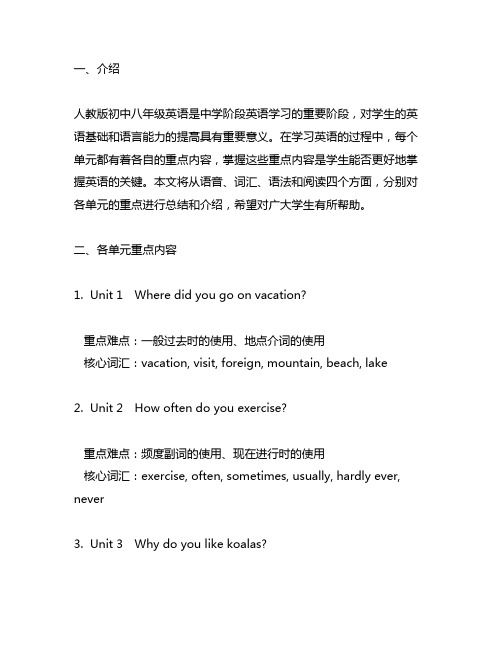
一、介绍人教版初中八年级英语是中学阶段英语学习的重要阶段,对学生的英语基础和语言能力的提高具有重要意义。
在学习英语的过程中,每个单元都有着各自的重点内容,掌握这些重点内容是学生能否更好地掌握英语的关键。
本文将从语音、词汇、语法和阅读四个方面,分别对各单元的重点进行总结和介绍,希望对广大学生有所帮助。
二、各单元重点内容1. Unit 1 Where did you go on vacation?重点难点:一般过去时的使用、地点介词的使用核心词汇:vacation, visit, foreign, mountain, beach, lake2. Unit 2 How often do you exercise?重点难点:频度副词的使用、现在进行时的使用核心词汇:exercise, often, sometimes, usually, hardly ever, never3. Unit 3 Why do you like koalas?重点难点:形容词性物主代词的使用、困难的句型whether引导的宾语从句核心词汇:koala, kangaroo, rmend, smart, cute4. Unit 4 I used to be afraid of the dark.重点难点:used to和be used to的区别、情态动词could的使用核心词汇:afraid, dark, thunder, storm, alone5. Unit 5 Do you want to watch a game show?重点难点:情态动词must的使用、陈述疑问句和特殊疑问句的变化核心词汇:game show, meaning, message, refuse, shelf6. Unit 6 I'm going to studyputer science.重点难点:一般将来时的使用、特殊疑问句和选择疑问句核心词汇:study, science, choice, voice, noise7. Unit 7 Will people have robots?重点难点:一般将来时的使用、被动语态的使用核心词汇:robot, scientist, hero, electricity, possible8. Unit 8 How do you make a banana milk shake?重点难点:祈使句的使用、过去进行时的使用核心词汇:banana, milk, shake, sugar, honey9. Unit 9 Can youe to my party?重点难点:情态动词can的使用、祈使句的变化核心词汇:party, concert, advise, worry, dish10. Unit 10 Where did you go on vacation?重点难点:比较级和最高级的用法、连词because和because of 的区别核心词汇:exciting, boring, noisy, interesting, expensive 三、总结学习初中八年级英语,熟练掌握各单元的重点内容对于学生来说至关重要。
小学英语人教版PEP五年级下册1-6单元知识点总结

Unit1 My day一、基本句型1.询问什么时候做某事:- When do you ……?你什么时候……?- I usually…at …. 我通常在…(点钟)…。
例:-When do you eat breakfast?-I eat breakfast at 7:00.2.What do you do on the weekend?你周末做什么?- I +频率副词+周末活动+时间。
或Sometimes I+周末活动例句:I sometimes go shopping with my mum on the weekend.(周末我时候和妈妈一起去购物)二、知识点:1.频率副词:always(总是,一直)>usually(通常)>often(经常)>sometimes(有时)2.只有Sometimes可以放在句首。
(Sometimes I cook dinner.)3.On the weekend 在周末on Saturdays 在周六on Sundays在周日(别忘加s)Unit2 My favourite season1.-Which season do you like best? (你最喜欢哪个季节?)Why?(为什么)-I like +季节+ best.(I like spring∕summer∕fall∕winter best) Because ___________.(因为)或:-What‘s your favourite season? -My favourite season is spring∕summer∕fall∕winter.2.-Why do you like winter best?(你为什么最喜欢冬天?) -Because______.二、知识点:1.leaf(树叶):复数leaves2.W,W真神奇,问出许多大问题。
what,what,问“什么”,when,when,问“时间”,where,where,问“哪里”,which,which,“哪一个”,why,why,“为什么”.Unit3 My school calendar补充:1.Dragon Boat Festival 龙舟节或端午节(农历五月五日)一般在阳历6月2.月份首字母大写。
九年级(全册)英语单元知识点、短语及句型总结

Unit 1一、知识点1.2.By: ①通过…..方式(途径)。
例:I learn English by listening to tapes.②在…..旁边。
例:by the window/the door③乘坐交通工具例:by bus/car④在……之前,到……为止。
例:by October在10月前⑤被例:English is spoken by many people.3.how与what的区别:how通常对方式或程度提问,意思有:怎么样如何,通常用来做状语、表语。
what通常对动作的发出者或接受者提问,意思为什么,通常做宾语,主语。
①How is your summer holiday? It’s OK.(how表示程度做表语)②How did you travel around the world? I travel by air.③What do you learn at school? I learn English, math and many other subjects.①What…think of…? How…like…?②What…do with…? How…deal with…?③What…like about…? How…like…?④What’s the weather like today? How’s the weather today?⑤What to do? How to do it?e.g. What do you think of this book?=How do you like this book?I don’do with the matter.=I don’dealwith it.What do you like about China?=How do you like China?I do n’t know what to do next step?=I don’t know how to do it next step?㊣What good / bad weather it is today!(weather为不可数名词,其前不能加a )㊣What a fine / bad day it is today! (day为可数名词,其前要加 a )4. aloud, loud与loudly的用法: 三个词都与"大声"或"响亮"有关。
新概念英语单元知识点归纳总结

新概念英语单元知识点归纳总结新概念英语是一套广受欢迎的英语教材,它以实用、系统和循序渐进的方式教授英语语言技能。
以下是对新概念英语各单元知识点的归纳总结:### 第一单元:基础语法与词汇- 重点语法:现在时态、过去时态、将来时态的构成与使用。
- 关键词汇:日常用语、基本动词、形容词、名词。
- 实用表达:问候、自我介绍、询问和回答个人信息。
### 第二单元:基本句型与对话- 重点语法:简单句、并列句、复合句的构成。
- 关键词汇:动词短语、常用副词、连接词。
- 实用表达:购物、问路、点餐等日常对话。
### 第三单元:时态与语态- 重点语法:进行时态、完成时态、被动语态的用法。
- 关键词汇:时间表达、频率副词、被动结构。
- 实用表达:描述正在进行的活动、已完成的事件。
### 第四单元:形容词与副词- 重点语法:形容词和副词的比较级与最高级。
- 关键词汇:描述性词汇、比较级和最高级形式。
- 实用表达:比较物品、表达喜好和厌恶。
### 第五单元:条件句与间接引语- 重点语法:条件句的构成,间接引语的使用。
- 关键词汇:条件词汇、报告他人言论的表达。
- 实用表达:表达假设情况、转述他人话语。
### 第六单元:非谓语动词- 重点语法:动名词、不定式、分词的使用。
- 关键词汇:动词的非谓语形式。
- 实用表达:描述习惯、计划和正在进行的动作。
### 第七单元:直接引语与间接引语- 重点语法:直接引语与间接引语的转换。
- 关键词汇:引述他人话语的词汇。
- 实用表达:准确转述对话内容。
### 第八单元:定语从句与状语从句- 重点语法:定语从句和状语从句的构成。
- 关键词汇:关系代词、连接副词。
- 实用表达:详细描述事物、表达时间、地点、原因等。
### 第九单元:虚拟语气- 重点语法:虚拟语气的用法,包括对现在、过去和将来的虚拟。
- 关键词汇:表达愿望、建议、命令的词汇。
- 实用表达:表达假设或非现实情况。
### 第十单元:复杂句型与段落写作- 重点语法:复杂句型的构成,段落的组织。
六年级上英语单元知识汇总 (外研版一起)

外研上册(一起)六年级Module 1 知识汇总一、词汇长度单位:kilometre(千米,公里) metre(米)li(里)其他:near(在......附近) along(沿着)二、习惯搭配三、知识点:❖ tell sb. about sth. (告诉某人某事)四、惯用表达五、重点句型提问某物的长度的句子:-How long is + 其他?-It’s + 数字+ 长度单位.eg: 1. -How long is the Great Wall?-It’s more than forty thousand li.2. -How long is the bridge?-It’s one hundred metres.外研(一起)六年级Module 2 知识汇总三、重点句型:1. 描述自己过去做过的事情:主语+ 动词过去式+ 其他.eg: 1. I went to the park yesterday.2. Daming ate delicious food last Sunday.2. 描述自己过去没有做过的事情:主语+ didn't + 动词原形+ 其他.eg: 1. I didn’t ride my bike because it was broken.2. Tom’s dog didn’t come back home yesterday.外研(一起)六年级Module 3 知识汇总四、重点句型:1. 询问“某人是否有某物”的句型及其答语:-Have you got...?-Yes, I have./ No, I haven’t.eg: 1. -Have you got any stamps from China?-Yes, I have.2. -Have you got a kite?-No, I haven’t.外研(一起)六年级Module 4 知识汇总一、词汇1. Thanksgiving 感恩节2. nearly差不多,将近3. sure 当然4. December十二月5. light 灯二、习惯搭配1. the Spring Festival春节2. on Thanksgiving 在感恩节3. have a lot of fun 过得很愉快4. write a poem 写一首诗5. my favourite day 我最喜欢的日子6. many countries许多国家7.Christmas trees 圣诞树8. give presents 送礼物9. send cards寄卡片三、惯用表达1. Yes, please. 好的,请吧。
人教版五年级英语知识点总结
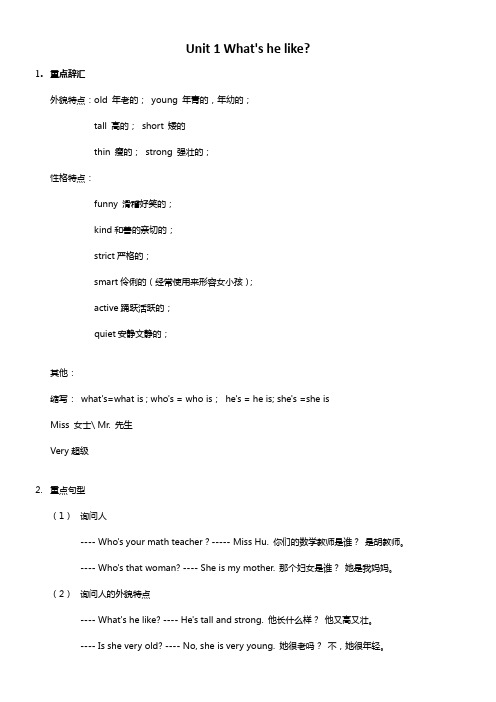
Unit 1 What's he like?1.重点辞汇外貌特点:old 年老的;young 年青的,年幼的;tall 高的;short 矮的thin 瘦的;strong 强壮的;性格特点:funny 滑稽好笑的;kind和善的亲切的;strict严格的;smart伶俐的(经常使用来形容女小孩);active踊跃活跃的;quiet安静文静的;其他:缩写:what's=what is ; who's = who is;he's = he is; she's =she isMiss 女士\ Mr. 先生Very超级2.重点句型(1)询问人---- Who's your math teacher?----- Miss Hu. 你们的数学教师是谁?是胡教师。
---- Who's that woman? ---- She is my mother. 那个妇女是谁?她是我妈妈。
(2)询问人的外貌特点---- What's he like? ---- He's tall and strong. 他长什么样?他又高又壮。
---- Is she very old? ---- No, she is very young. 她很老吗?不,她很年轻。
---- Is he very short? ---- No, he isn't. He's very tall. 他很矮吗?不,他很高。
(3)询问人的性格特点---- Is she very quiet? ---- No, she isn't. She's very active. 她很安静吗?不,她很活跃。
---- Is she very strict? ---- Yes, she is, but she's very kind. 她很严格吗?是的,可是她很和善。
高一英语必修一第一单元重点语法及知识点

高一英语必修一第一单元重点语法及知识点以下是人教版高一英语必修一第一单元重点语法及知识点:- 重点词汇和短语:- add up- upset- ignore- calm down- have got to- concern- go through- set down- a series of- on purpose- in order to- at dusk- face to face- no longer- settle- suffer- recover- get/be tired of- pack- get along with- fall in love- disagree- join in- 重点句型:- It was the first time in a year and a half that I had seen the night face to face.- I wonder if it’s because I haven’t been able to be outdoors for so long that I’ve grown so crazy about everything to do with nature.- I stayed awake on purpose until half past eleven one evening in order to have a good look at the moon for once by myself.- If you have some trouble getting along with your friends, you can write to the editor and ask for advice.- Add up your score and see how many points you can get.- What he did has added to our difficulties.- His income adds up to $1000 a month.- It' s no pleasure looking through these any longer because nature is one thing that really must be experienced.- Why is she so concerned about his attitude to her work?- The police asked him to set down what he had seen in a report.- As I was about to go out and search for him, he happened to come in.- Mr. Jones lives alone and often feels lonely.- We tried to calm him down, but he kept crying.- Does he dare (to) go out at night in such stormy weather?- He would go through fire and water for his country.- That country suffered a heavy loss in the flood.- 语法总结:- 直接引语和间接引语(一)- 直接引语:直接引述别人的原话。
初三英语上册各单元重要知识点汇总

初三英语上册各单元重要知识点汇总初三是整个初中学习最为关键的一年,本篇是九年级上册所有知识点,包括重点句型、短语、知识点详解和重点语法。
Unit1 The Changing WorldTopic1 Our country has developed rapidly.【重点短语和句型】1.have a good summer holiday暑假过得愉快e back from从......回来3.have/has been to去过4.have/has gone to去了5.not...any more再也不...6.take photos照相7.by the way顺便问一下8.take part in参加9.around/all over/throughout the world全世界10.tell sb. something about...告诉某人关于某事11.have/live a happy/hard life过着幸福/艰苦的生活12.describe...in detail详细描述13.give support to支持...14.see...oneself亲眼看见15.keep in touch with与...保持联系16.far away遥远的17.kinds/sorts of各种各样的...18.not only...but also不仅...而且...19.make progress取得进步20.more than/over多于21.develop/improve rapidly迅速发展/改善22.tell sb. (not ) to do sth.告诉某人(别)做某事23.ask sb. (not ) to do sth.要求某人(别)做某事24.in order to do sth.为了做某事25.have to do sth.不得不做某事26. It's +形容词+for sb. to do sth.对于某人来说做某事是...的27.why not do sth.为什么不做某事28.succeed/be successful in doing sth.成功地做某事29.dream about doing sth.梦想做某事30.see/hear sb. do/doing sth.看见/听见某人做/正在做某事【重点语法】现在完成时一. 现在完成时的基本结构肯定句:主语+have/has+动词的过去分词+其他否定句:主语+have/has+not+动词的过去分词+其他一般疑问句:Have/Has+主语+动词的过去分词+其他特殊疑问句:特殊疑问词+一般疑问句(have/has+主语+过去分词+其他)二. 现在完成时的用法1. 现在完成时用来表示过去已经完成的动作对现在造成影响或后果。
Units1-4单元复习知识点人教版八年级英语上册

第一单元重点语法【一般过去时】1.概念:表示过去某个时间里发生的动作或状态;过去习惯性、经常性的动作、行为;过去主语所具备的能力和性格。
2.时间标志词1. yesterday, the day before yesterday2. 时间段+ago: three years ago, long ago…3. last: last day/ week/ year…4. in+过去年份: in 2015…5. just now 刚才【复合不定代词】复合不定代词是由some-,any-,no-,every-加上-one,-body,-thing等所组成的不定代词。
例如:Everyone wants to win.考向二:复合不定代词被形容词修饰,形容词后置例如:I have something interesting to tell you.考点三:辨析something/someone/somebody,anything/anyone/anybody,nothing/noone/nobody,everything/everyone/everybody1.something,someone,somebody通常用于肯定句中2.anything,anyone,anybody一般用于否定句、疑问句或条件状语从句中。
3. not....anything = nothing注意:1)在表示请求、邀请、提建议等带有委婉语气的疑问句,和希望得到对方肯定答复的疑问句,以及表示反问的问句中,也用something,someone,somebody等复合不定代词。
如:Would you like something to eat?2)当anything表示“任何事(物),无论何事(物)”,anyone,anybody表示“无论谁,任何人”等意义时,它们也可以用于肯定句中。
如:Anybody knows the answer.任何人都知道答案。
六年级上册英语一到四单元知识点
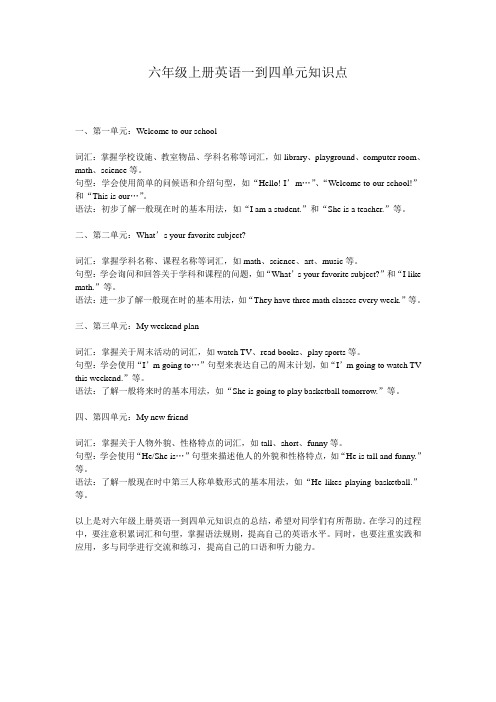
六年级上册英语一到四单元知识点一、第一单元:Welcome to our school词汇:掌握学校设施、教室物品、学科名称等词汇,如library、playground、computer room、math、science等。
句型:学会使用简单的问候语和介绍句型,如“Hello! I’m…”、“Welcome to our school!”和“This is our…”。
语法:初步了解一般现在时的基本用法,如“I am a student.”和“She is a teacher.”等。
二、第二单元:What’s your favorite subject?词汇:掌握学科名称、课程名称等词汇,如math、science、art、music等。
句型:学会询问和回答关于学科和课程的问题,如“What’s your favorite subject?”和“I like math.”等。
语法:进一步了解一般现在时的基本用法,如“They have three math classes every week.”等。
三、第三单元:My weekend plan词汇:掌握关于周末活动的词汇,如watch TV、read books、play sports等。
句型:学会使用“I’m going to…”句型来表达自己的周末计划,如“I’m going to watch TV this weekend.”等。
语法:了解一般将来时的基本用法,如“She is going to play basketball tomorrow.”等。
四、第四单元:My new friend词汇:掌握关于人物外貌、性格特点的词汇,如tall、short、funny等。
句型:学会使用“He/She is…”句型来描述他人的外貌和性格特点,如“He is tall and funny.”等。
语法:了解一般现在时中第三人称单数形式的基本用法,如“He likes playing basketball.”等。
人教版八年级英语下册各单元知识点汇总
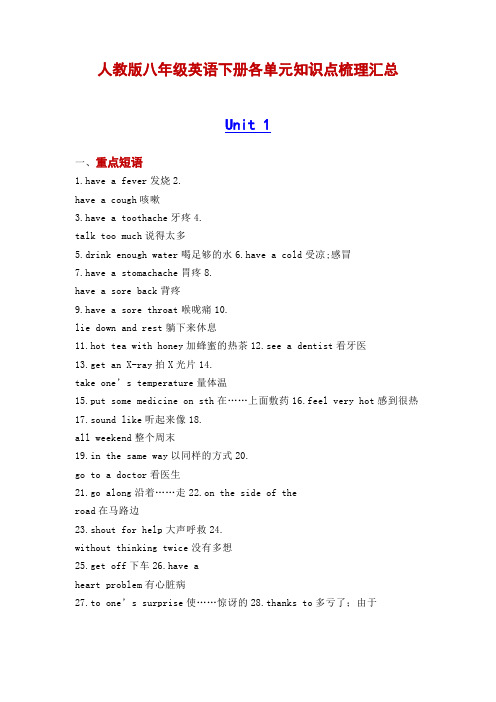
人教版八年级英语下册各单元知识点梳理汇总Unit 1一、重点短语1.have a fever发烧2.have a cough咳嗽3.have a toothache牙疼4.talk too much说得太多5.drink enough water喝足够的水6.have a cold受凉;感冒7.have a stomachache胃疼8.have a sore back背疼9.have a sore throat喉咙痛10.lie down and rest躺下来休息11.hot tea with honey加蜂蜜的热茶12.see a dentist看牙医13.get an X-ray拍X光片14.take one’s temperature量体温15.put some medicine on sth在……上面敷药16.feel very hot感到很热17.sound like听起来像18.all weekend整个周末19.in the same way以同样的方式20.go to a doctor看医生21.go along沿着……走22.on the side of theroad在马路边23.shout for help大声呼救24.without thinking twice没有多想25.get off下车26.have aheart problem有心脏病27.to one’s surprise使……惊讶的28.thanks to多亏了;由于29.in time及时30.save a life挽救生命31.get into trouble造成麻烦32.right away立刻;马上33.because of由于34.get out of离开35.hurt oneself受伤36.put a bandage on sth.用绷带包扎37.fall down摔倒38.feel sick感到恶心39.have a nosebleed流鼻血40.cut his knee割伤他的膝盖41.put her head back把她的头向后仰42.have problems breathing呼吸困难43.mountain climbing登山运动44.be used to doing sth.习惯做某事45.run out(of)用完;用尽46.so that以便47.so…that如此……以至于……48.be in control of掌管;管理49.in a difficult situation在逆境屮50.keep on doing sth.坚持做某事51.make a decision做出决定52.take risks冒险53.give up放弃二、重点句型1.You need to take breaks away from the computer.你需要远离电脑,休息一下。
九年级全一册英语知识点总结

2. where I’m from , we’re pretty relaxed about time. 在我们那个地方,我们的时间观念比较随意
3. We often just drop by our friends’ homes. 我们时常去朋友家拜访
2. What do you like best about… What do you like best about the Dragon Boat Festival?
3. what a great day! 感叹句句:多么美好的一天!
4.I wonder if ….我想知道 I wonder if it’s similar to Water Festival of the Dai people
Unit 3 Could you please tell me where the restrooms are?
问路常用的句子: 1. Do you know where…is? 2. Can you tell me how I can get to…? 3. Could you tell me how to get to….? 4. Could /will/would you please tell me sth.? 例句: Could you tell me how to get to the park?
3. what do you dislike about this CD. 你不喜欢这张CD的什么?
4. what does it remind you of ? 它使你想起了什么?
5. it does have a few good features, though. 然而,他的确有好的方面
剑桥少儿英语一级上册各单元知识点汇总
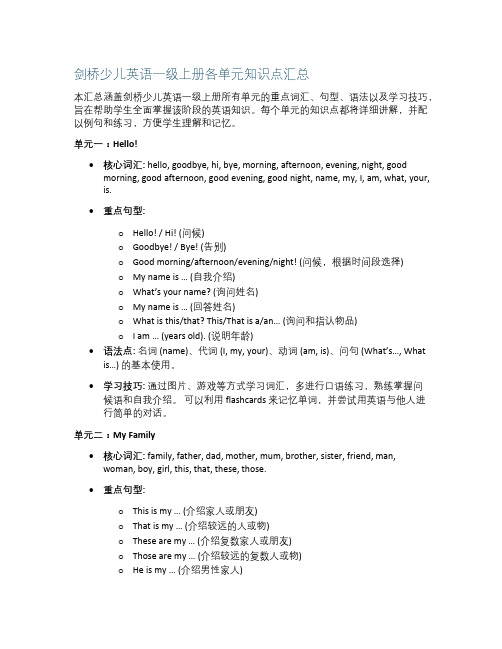
剑桥少儿英语一级上册各单元知识点汇总本汇总涵盖剑桥少儿英语一级上册所有单元的重点词汇、句型、语法以及学习技巧,旨在帮助学生全面掌握该阶段的英语知识。
每个单元的知识点都将详细讲解,并配以例句和练习,方便学生理解和记忆。
单元一:Hello!•核心词汇: hello, goodbye, hi, bye, morning, afternoon, evening, night, good morning, good afternoon, good evening, good night, name, my, I, am, what, your, is.•重点句型:o Hello! / Hi! (问候)o Goodbye! / Bye! (告别)o Good morning/afternoon/evening/night! (问候,根据时间段选择)o My name is … (自我介绍)o What’s your name? (询问姓名)o My name is … (回答姓名)o What is this/that? This/That is a/an… (询问和指认物品)o I am … (years old). (说明年龄)•语法点:名词 (name)、代词 (I, my, your)、动词 (am, is)、问句(What’s…, What is…) 的基本使用。
•学习技巧:通过图片、游戏等方式学习词汇,多进行口语练习,熟练掌握问候语和自我介绍。
可以利用 flashcards 来记忆单词,并尝试用英语与他人进行简单的对话。
单元二:My Family•核心词汇: family, father, dad, mother, mum, brother, sister, friend, man, woman, boy, girl, this, that, these, those.•重点句型:o This is my … (介绍家人或朋友)o That is my … (介绍较远的人或物)o These are my … (介绍复数家人或朋友)o Those are my … (介绍较远的复数人或物)o He is my … (介绍男性家人)o She is my … (介绍女性家人)•语法点:名词的单复数 (family/families, brother/brothers),指示代词 (this, that, these, those) 的使用,人称代词 (he, she) 的引入。
七上英语各单元重点短语和句型汇总

七上英语各单元重点短语和句型汇总Unit 1 Making New Friends【重点短语】1. good morning/ afternoon / evening 早上/下午/晚上好2. glad / nice to meet / see you 见到你很高兴3. welcome to + 地点欢迎来到……4. let’s + v 让我们做……5. stand up 起立6. sit down 坐下7. this is... 这是……8. thanks = thank you 谢谢9. see you = see you later = goodbye 再见10. ID number 身份证号码11. be from=come from 来自12. in English 用英语【重要句型】1. ---What’s your name? ---My name is Sally.2. ---Where are you from? ---I’m from China.---Where do you come from? ---I come from China.3. ---Where is he/ she from? ---He/She is from Japan.4. ---What’s this/ that in English? --- It’s a/ an…5. ---What’re these/ those in English? ---They’re…6. ---How do you spell it? ---E-R-A-S-E-R, eraser.7. ---Can you spell it? ---Yes, M-A-P, map.8. —How old are you/ is he/ are they?—I’m/ He is/ They are eleven.9. —What’s your telephone number?—It’s 4567967.10. —What class/ grade are you in?—I’m in Class Ten, Grade Seven.(注意大小写)11. Good morning/ afternoon/ evening.12. —Hello!/Hi! —Hello!/Hi!13. —Nice/Glad to see/meet you. —Nice/Glad to see/meet you, too.14. —Welcome to China/my home. —Thanks.15. —How do you do? —How do you do?16. —How are you? —Fine, thank you. And you? —I’m OK.17. —See you then/ later. —See you.18. —Goodbye. —Bye.19. —Thank you. —You’re welcome./That’s OK./Not at all.Unit 2 Looking Different【重点短语】1. give sb. sth. = give sth. to sb.把某物给某人Please give it to her.2. look the same 长相相同look different 长相不同,看起来不一样3. look like 看起来像He looks like his father. = He and his father look the same.4. next to 在……旁边The boy next to me is my good friend.5. in +颜色穿着……颜色的衣服in +a/an +颜色+衣服穿着……颜色的……The boy in a yellow T-shirt and gray pants is my good friend.6. (1) both两者都(be动词之后,实义动词之前)They both have brown hair and black eyes.They are both office workers.(2)all 三者或三者以上都They are all kind to me.7. 数字+(形状、大小)+颜色+n.two big red applesShe has short blond hair.【重点句型】1. Who is your favorite actor?2. We are in the same school, but we are in different grades.3. What do/does +主语+look like? ……长得怎么样?---What does he look like?--- He is not very tall but very strong.4. We don’t look the same, but we are good friends.We look the same, but we are in different clothes.5. ---What color is/are +主语?---It’s/ They’re +颜色.---What color is her hair? ---It’s blond.6. This is my cap. = This cap is mine.Is this your cap? = Is this cap yours?---Whose cap is this? = Whose is this cap? --- It’s Sally’s.---Whose are these bananas? --- They’re their bananas/ theirs.7. His pants are blue and mine are white.(mine=my pants)My T-shirt is green and his is brown.(his=his T-shirt)8. I have small eyes, but he has big ones.(ones指代eyes)My jacket is blue and white. That one is blue. (one指代jacket)Unit3 Getting Together【重点短语和句型】1. Could you please + 动词原形……?用来表示委婉的请求---Could you please tell me your name?--- Sure/ No problem. My name is Sally.--- Sorry.2. tell sb. sth. = tell sth. to sb. 告诉某人某事tell sb. about sth. 告诉某人关于某事Please tell me your name. = Please tell your name to me.Please tell Maria about it. 请把这件事告诉玛丽亚吧。
三年级英语一单元知识点

三年级英语一单元知识点一、重点单词。
1. 文具类。
- pen(钢笔):用于书写,复数形式是pens。
例如:I have a pen.(我有一支钢笔。
)- pencil(铅笔):书写工具,复数是pencils。
如:This is my pencil.(这是我的铅笔。
)- pencil - box(铅笔盒):用来装铅笔、橡皮等文具,复数为pencil - boxes。
例如:My pencil - box is blue.(我的铅笔盒是蓝色的。
)- ruler(尺子):测量和绘图工具,复数rulers。
如:I use my ruler to draw a line.(我用我的尺子画一条线。
)- eraser(橡皮):用于擦除铅笔字迹,复数erasers。
例如:I need an eraser.(我需要一块橡皮。
)- crayon(蜡笔):用于画画,复数crayons。
如:These crayons are colorful.(这些蜡笔是五颜六色的。
)2. 其他单词。
- book(书):复数books。
例如:I like reading books.(我喜欢读书。
)- bag(书包):用来装书本、文具等物品,复数bags。
如:My bag is heavy.(我的书包很重。
)二、重点句型。
1. 介绍自己有什么文具。
- I have a/an...(我有一个……)- I have a pen.(我有一支钢笔。
)- I have an eraser.(我有一块橡皮。
)2. 询问对方有什么文具。
- What do you have?(你有什么?)- A: What do you have? B: I have a pencil - box.(A:你有什么?B:我有一个铅笔盒。
)3. 展示自己的文具并询问对方意见。
- Look! I have a new ruler.(看!我有一把新尺子。
)- A: Look! I have a new crayon. B: It's nice.(A:看!我有一支新蜡笔。
四年级上册英语单元知识点归纳
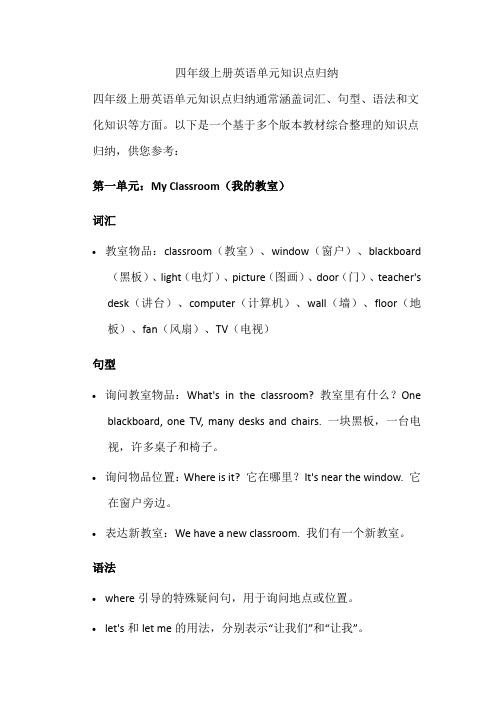
四年级上册英语单元知识点归纳四年级上册英语单元知识点归纳通常涵盖词汇、句型、语法和文化知识等方面。
以下是一个基于多个版本教材综合整理的知识点归纳,供您参考:第一单元:My Classroom(我的教室)词汇•教室物品:classroom(教室)、window(窗户)、blackboard (黑板)、light(电灯)、picture(图画)、door(门)、teacher's desk(讲台)、computer(计算机)、wall(墙)、floor(地板)、fan(风扇)、TV(电视)句型•询问教室物品:What's in the classroom? 教室里有什么?One blackboard, one TV, many desks and chairs. 一块黑板,一台电视,许多桌子和椅子。
•询问物品位置:Where is it? 它在哪里?It's near the window. 它在窗户旁边。
•表达新教室:We have a new classroom. 我们有一个新教室。
语法•where引导的特殊疑问句,用于询问地点或位置。
•let's和let me的用法,分别表示“让我们”和“让我”。
第二单元:My Schoolbag(我的书包)词汇•书籍类:Chinese book(语文书)、English book(英语书)、maths book(数学书)、storybook(故事书)•书包物品:schoolbag(书包)、candy(糖果)、notebook(笔记本)、toy(玩具)、key(钥匙)句型•询问书包物品:What's in your schoolbag? 你的书包里有什么?An English book, a maths book, and three storybooks. 一本英语书,一本数学书,和三本故事书。
•询问颜色:What color is it? 它是什么颜色的?It's blue and white.它是蓝白色的。
三年级英语书新版
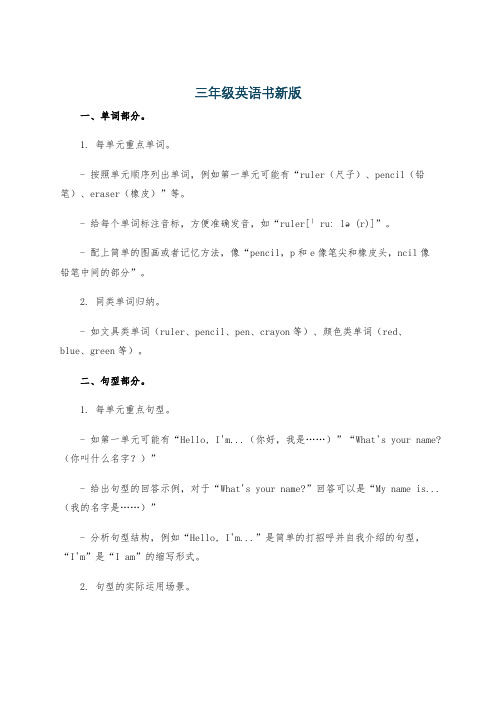
三年级英语书新版一、单词部分。
1. 每单元重点单词。
- 按照单元顺序列出单词,例如第一单元可能有“ruler(尺子)、pencil(铅笔)、eraser(橡皮)”等。
- 给每个单词标注音标,方便准确发音,如“ruler[ˈruːlə(r)]”。
- 配上简单的图画或者记忆方法,像“pencil,p和e像笔尖和橡皮头,ncil像铅笔中间的部分”。
2. 同类单词归纳。
- 如文具类单词(ruler、pencil、pen、crayon等)、颜色类单词(red、blue、green等)。
二、句型部分。
1. 每单元重点句型。
- 如第一单元可能有“Hello, I'm...(你好,我是……)”“What's your name?(你叫什么名字?)”- 给出句型的回答示例,对于“What's your name?”回答可以是“My name is...(我的名字是……)”- 分析句型结构,例如“Hello, I'm...”是简单的打招呼并自我介绍的句型,“I'm”是“I am”的缩写形式。
2. 句型的实际运用场景。
- 对于“Hello, I'm...”可以用于初次见面时的自我介绍,如在新班级里向同学介绍自己。
三、语法部分(三年级语法较为基础)1. 名词的单复数。
- 简单介绍在课本中出现的名词单复数情况,像“a pen”(单数),“two pens”(复数),复数形式一般在名词后面加“s”。
2. 形容词的使用。
- 例如在描述颜色时,“This is a red apple.”(这是一个红色的苹果),说明形容词“red”用来修饰名词“apple”。
四、课文部分。
1. 每篇课文的翻译。
- 准确翻译课文内容,帮助理解课文大意。
2. 课文中的重点知识点。
- 如课文中的新单词、句型、语法等内容的强调。
五、练习部分。
1. 课本后的练习题类型。
- 有单词拼写、选择正确的单词、句型填空等类型。
- 1、下载文档前请自行甄别文档内容的完整性,平台不提供额外的编辑、内容补充、找答案等附加服务。
- 2、"仅部分预览"的文档,不可在线预览部分如存在完整性等问题,可反馈申请退款(可完整预览的文档不适用该条件!)。
- 3、如文档侵犯您的权益,请联系客服反馈,我们会尽快为您处理(人工客服工作时间:9:00-18:30)。
Grammar:
特殊疑问词 why (…because), who Passage: Talk about favorites.
语法: 1. why-because 中考说明-:掌握常用属连词的基本用法。 如: when, before, after, because, if等。 功能意念: 态度(attitudes) 偏爱和爱好 : My favorite subject is science. I prefer P.E. Which do you prefer, music or art? I like English better/ (the) best. 逻辑关系 (Logical relations ) 原因和结果: Why are you late for school? Because I got up late ... Because of the bad traffic, we missed the train.
Vocabulary & target language
Sentences:
1. --Why do you / does he like art? --Because it’s interesting/fun/relaxing … 2.--Who is your art teacher? -- My art teacher is Mrs. Jones. 3. --When do you have science? --I have science on Tuesday. 4. Lunch is from 12:00 to 1:00. 5. My classes finish at 1:50, but ….for 2 hours.
Grammar:
1. 一般现在时(like / likes) 2. 可数名词&不可数名词
Passage: Talk about eating habits.
语法: 可数名词复数和不可数名词 中考说明: 理解并能区别所学的可数名词和不可数名词。 熟练掌握可数名词复数形式的构成及用法。 功能意念: 态度(attitudes) 喜欢和不喜欢: I like / love salad (very much). I like eating salad. I’m interested in … I don’t like …at all. I don’t enjoy eating salad. I hate to do homework.
句
2. Do you like bananas?
1. Do you like bananas? Yes, I do./No, I don’t. Do they like pears? Yes, they do./No, they don’t. Does she like tomatoes? Yes, she does./No, she doesn’t. 2. I like oranges but I don’t like bananas. We like rice but we don’t like hamburgers. He likes ice-cream but he doesn’t like vegetables
按照单元重点句型和知识点
考查范围 范围:七年级上 全册 (侧重Units 5-9)
考查内容
Unit 5 Do you have a soccer ball? 话题项目-1:个人情况—personal data 话题项目-16:文娱与体育—Sports and games Unit 6 Do you like bananas? 话题项目-1:个人情况—Interests and hobbies 话题项目-12:饮食—Food and drink; Eating customs 话题项目-13:卫生与健康—Health diet Unit 7 How much are these socks? 话题项目-11:购物—Shopping Unit 8 When is your birthday? 话题项目-1:个人情况—personal data 话题项目-5:学校— School activities Unit 9 My favorite subject is science. 话题项目-1:个人情况—Interests and hobbies 话题项目-5:学校—school subjects
Vocabulary & target language
Sentences:
1. He likes hamburgers, but he doesn’t like salad. 2. What about burgers? 3. She likes eggs, bread and apples for breakfast. 4. Let’s think about the food. 5. I don’t want to be fat. 6. David asks the volleyball star about her eating habits.
Vocabulary & target language
Sentences:
1.-- When is the basketball game? -- It’s at 3:00 this afternoon. 2. --How old are you? --I’m 12. 3. Do you want to come to my birthday party? 4. We have an English party on Nov. 30th. 5. Have a good time!
Grammar:
1. 特殊疑问词 when 2. 序数词1-31
Passage:Talk about school activities and dates.
语法: 1.序数词: 1st---31st
中考说明: 掌握序数词的形式及基本用法。
2. 介词: on Dec. 20th, in December, at 3:00, in the afternoon 中考说明:熟练掌握常用介词的基本用法(表示 时间等)。 如:in, on , at, of, from, to, for, …
功能意念项目: 社会交往 (Social communications) 告别(略) 祝愿和祝贺: Have a good time/ trip/ journey! Enjoy yourself! Best wishes to you! Good luck! The same to you.
功能意念: 时间(Time) 时刻: When …? I … in 1998. What time do you …every day? I … at 6:00. 特征 (Features) 年龄: How old are you? How old is he/ she? I’m eighteen. He/ She is 8 years old.
Grammar:
1. 一般现在时(do/does)(have / has) 2. 连词 but
Passage: Introduce the sports equipment.
语法:一般现在时构成和基本用法 1.do/ does, have/has 中考说明:熟练掌握。 2.but 中考说明:掌握基本用法。如and, but, or, so等。 功能意念: 1、社会交往 (Social communications) 建议: Let’s play basketball. What / How about baseball? That sounds good. OK. 2、态度(attitudes) 同意和不同意: Sure. Certainly. Of course. All right. I agree. No problem. That’s a good idea. I think so.
Grammar:
1. 特殊疑问词 how much 2. 基数词
Passage: Write an ad.
语法: 1.基数词 中考说明: 掌握基数词的形式及基本用法。 2. 疑问副词:how many, how much 3. 复数词:shorts, trousers, shoes等 功能意念: 1社会交往 (Social communications) 提供帮助与感谢 : Can I help you? What can I do for you? Yes, please. Yes, thanks. That would be nice. Thank you for your help. Thank you all the same.
功能意念:
购物:A: (clerk) -Can I help you? / What can I do for you? -How many/ much would you like/ do you want? -What color/ size / kind would you like/ do you want? -What about this one? -Here’s your change. B: (customer) -I want/ I’d like a pair of shoes. -How much is it/ are they? -May I try it on? -It’s too big/ small. -Sorry, it’s too expensive. -Do you have any other colors/ sizes/ kinds? -Two and a half kilos/ pounds, please. -That’s fine. I’ll take it. -Just have a look. -Well, I’ll think about it.
Vocabulary & target language
